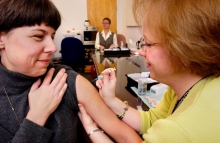WHO new injection safety policy will also protect health workers

Unsafe injections result in the transmission of blood-borne pathogens from patient to patient (through re-use of syringes) and patient to health care worker (from needle-stick injuries).
PSI served on the Guideline Development Group that drafted the “WHO guideline on the use of safety-engineered syringes” that recommends two major means to enhance injection safety globally:
- Switching to syringes that have sharps injury protection features (SIP devices) to reduce sharps injuries to healthcare workers
- Switching to syringes that have re-use protection features (RUP) to reduce re-use that is harmful to patients
Ideally, safety-engineered – or “smart” - syringes will have both sharps injury and re-use protection. A recent cost-effectiveness study commissioned by WHO shows that safety-engineered syringes can save on average more than $14.00 for each $1.00 invested in their procurement.
WHO is recommending that all countries should transition by 2020 to the exclusive use of WHO-prequalified (or equivalent) safety-engineered syringes for all appropriate uses, and develop related national policies to bring about a smooth transition.
The policy is the cornerstone of a new WHO Global Injection Safety Campaign in development that will stress two further major components of injection safety:
- Reduction of injection use frequency when and where injections are overused, unnecessary and easily replaced by oral formulations
- Promotion of safe sharps waste management to protect the entire community
PSI has been campaigning for safer injection devices for many years, through work with the WHO and PSI affiliates in collaboration with the Safe Injection Global Network (SIGN). PSI affiliate SOLSICO in the Democratic Republic of Congo advocated for retractable syringes between 2009 and 2011, raising awareness about the risks of exposure to Hepatitis, HIV and even Ebola virus from needle-stick injuries when using unsafe syringes.
In 2010 PSI made the video “Sharp Sense” to advocate for injection safety. The video and accompanying discussion guide are available in English, French, German, Portuguese and Spanish.
PSI is now calling on affiliates to urge their governments to implement the new WHO policy and to develop national policy to ensure full transition to the exclusive use of safety engineered injection devices by 2020.
Please monitor the WHO’s recommendations below and how they are applied in your country.
- International and local manufacturers should be strongly encouraged to switch to safety-engineered injection devices production as soon as possible.
- Countries should accompany their national policies on injection safety with a clear implementation strategy, including healthcare workers’ training.
- Donor agencies and development partners should fund the procurement of only safety-engineered injection devices in projects and programmes.
- Donor agencies financing injectable products (vaccines, contraceptives, medications) must also finance appropriate quantities of safety-engineered injection devices and provide for healthcare workers’ training.
- Develop standards for rational use and supply of standard disposable syringes for specific procedures and settings where they remain necessary (for example, syringes with a re-use prevention feature are not appropriate for certain medical procedures such as maintenance of intravenous lines, local anaesthesia and nasal feeding).
More details of the WHO’s recommendations.
This is a highly beneficial and long awaited development for healthcare workers, and PSI will be collecting information about how the new WHO policy affects our members. We look forward to feedback from our affiliates. Please send information to Odile.Frank@world-psi.org.

